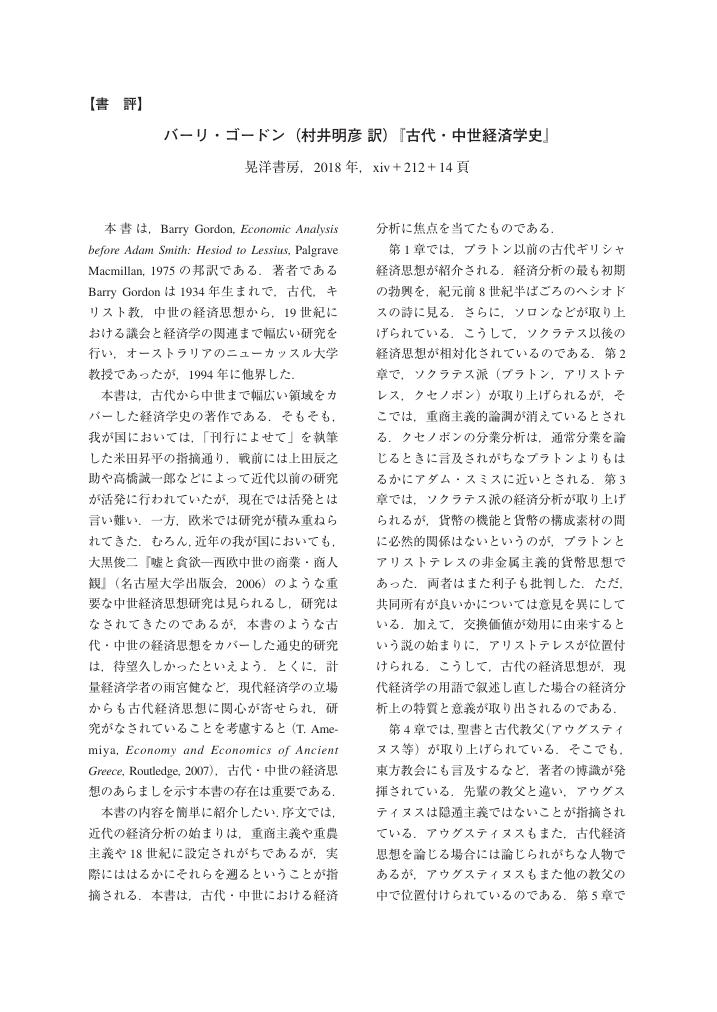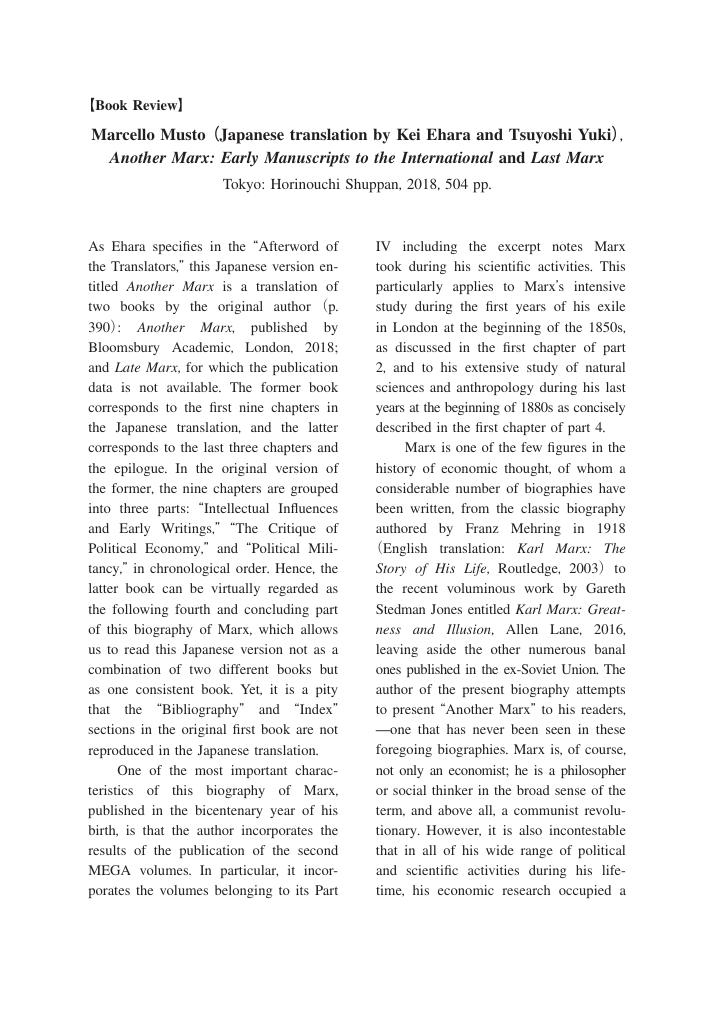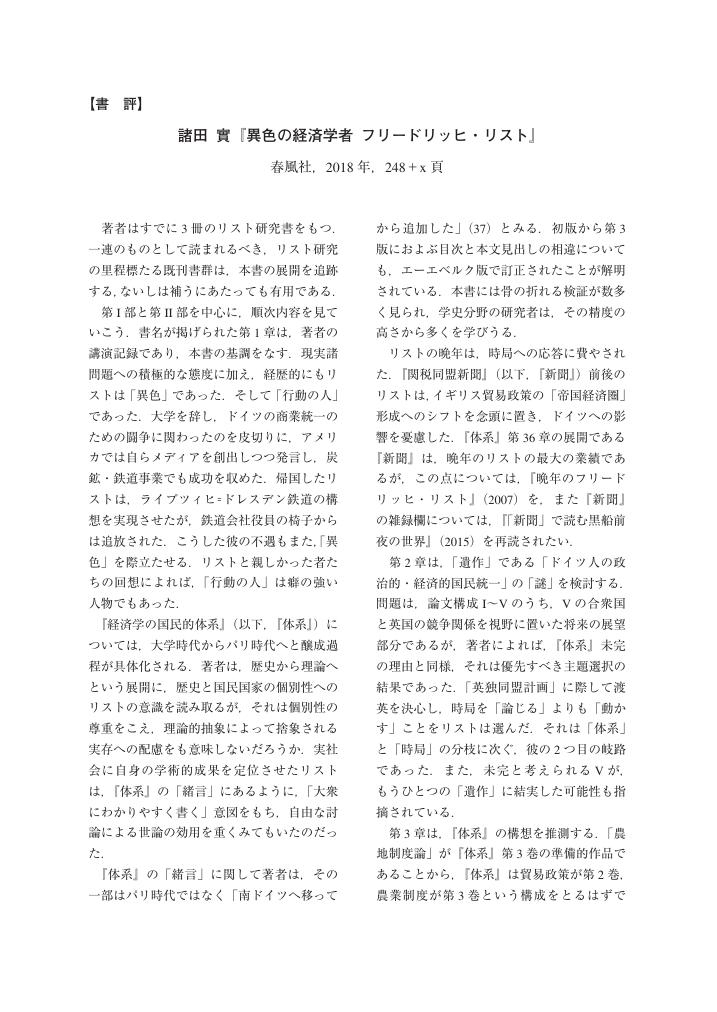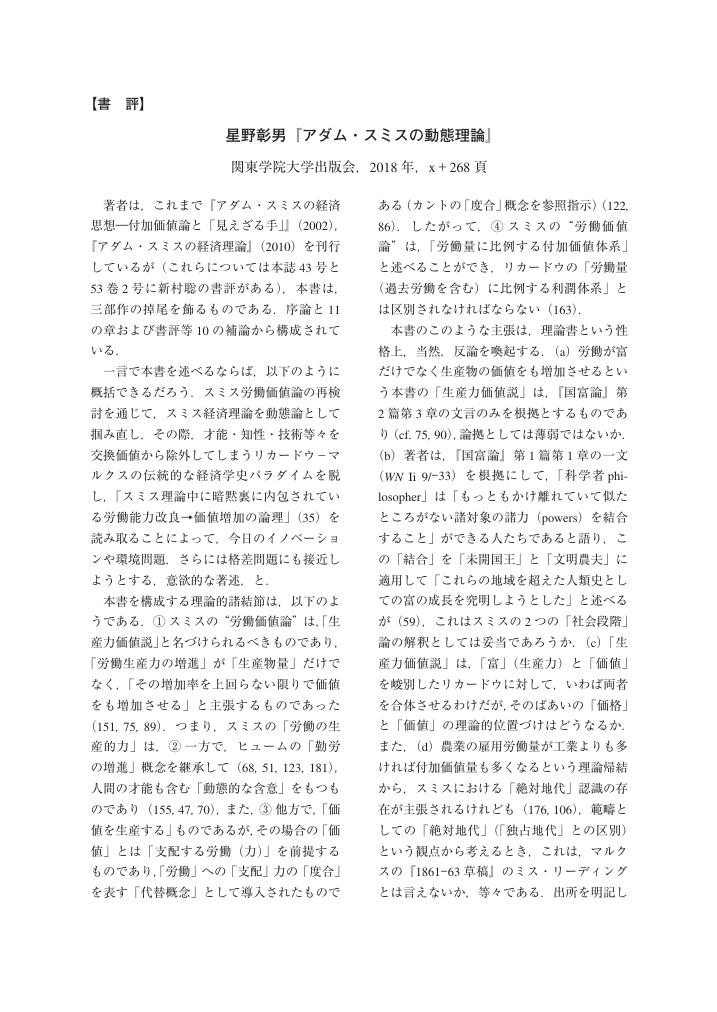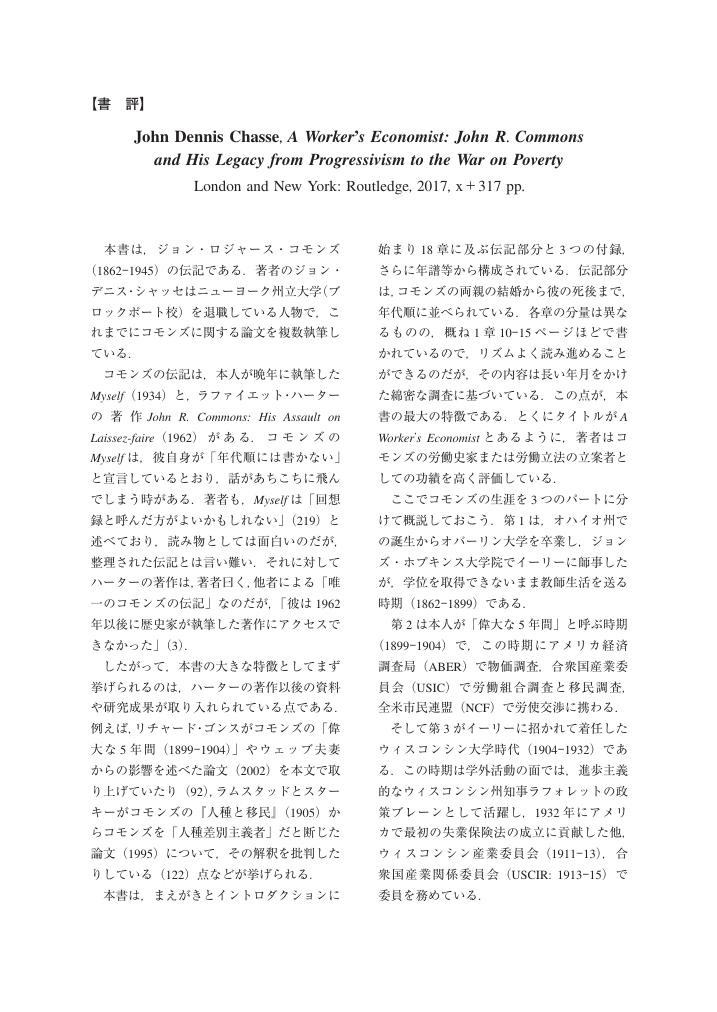- 著者
- 泉 正樹
- 出版者
- 経済学史学会
- 雑誌
- 経済学史研究 (ISSN:18803164)
- 巻号頁・発行日
- vol.61, no.2, pp.86-87, 2020 (Released:2020-02-29)
- 著者
- 野原 慎司
- 出版者
- 経済学史学会
- 雑誌
- 経済学史研究 (ISSN:18803164)
- 巻号頁・発行日
- vol.61, no.2, pp.88-89, 2020 (Released:2020-02-29)
- 著者
- 仲北浦 淳基
- 出版者
- 経済学史学会
- 雑誌
- 経済学史研究 (ISSN:18803164)
- 巻号頁・発行日
- vol.61, no.2, pp.90-91, 2020 (Released:2020-02-29)
- 著者
- 竹永 進
- 出版者
- 経済学史学会
- 雑誌
- 経済学史研究 (ISSN:18803164)
- 巻号頁・発行日
- vol.61, no.2, pp.92-93, 2020 (Released:2020-02-29)
- 被引用文献数
- 1
1 0 0 0 OA 諸田實『異色の経済学者 フリードリッヒ・リスト』春風社,2018年,248+x 頁
- 著者
- 大塚 雄太
- 出版者
- 経済学史学会
- 雑誌
- 経済学史研究 (ISSN:18803164)
- 巻号頁・発行日
- vol.61, no.2, pp.94-95, 2020 (Released:2020-02-29)
- 著者
- 大槻 忠史
- 出版者
- 経済学史学会
- 雑誌
- 経済学史研究 (ISSN:18803164)
- 巻号頁・発行日
- vol.61, no.2, pp.96-97, 2020 (Released:2020-02-29)
- 著者
- 堂目 卓生
- 出版者
- 経済学史学会
- 雑誌
- 経済学史研究 (ISSN:18803164)
- 巻号頁・発行日
- vol.61, no.2, pp.98-99, 2020 (Released:2020-02-29)
- 著者
- 浅田 統一郎
- 出版者
- The Japanease Society for the History of Economic Thought
- 雑誌
- 経済学史研究 (ISSN:18803164)
- 巻号頁・発行日
- vol.61, no.1, pp.135-136, 2019 (Released:2019-10-14)
1 0 0 0 OA 星野彰男『アダム・スミスの動態理論』関東学院大学出版会,2018 年,x+268 頁
- 著者
- 佐藤 滋正
- 出版者
- 経済学史学会
- 雑誌
- 経済学史研究 (ISSN:18803164)
- 巻号頁・発行日
- vol.61, no.1, pp.139-140, 2019 (Released:2019-10-14)
- 著者
- 熊谷 次郎
- 出版者
- The Japanease Society for the History of Economic Thought
- 雑誌
- 経済学史研究 (ISSN:18803164)
- 巻号頁・発行日
- vol.61, no.2, pp.1-21, 2020 (Released:2020-02-26)
Contemporary British historians are almost unanimous in positing a close relation between the growth of the British economy and the colonial empire after the Glorious Revolution. The formation of the British colonial empire concurrently led to a new turn in mercantile economic thought. During the late 17th and early 18th centuries, the rationale for the concept and significance of the advantages of foreign trade shifted from the “balance of trade” theory to the “balance of labor” or “foreign-paid incomes” one. L. Magnusson, a leading contemporary scholar on mercantilism, attributes the emergence of the latter theory partly to the advent of a new science of trade,2 but he hardly mentions the relation between the theory and the remarkable development of colonial empire trade. Most mercantilists employing this theory, however, assiduously regarded British colonies and dependencies as growing and promising markets for the development of various industries as well as the increase in labor employment in Britain. This paper attempts to illustrate the importance of the theory in the context of both an emerging transatlantic colonial empire and an awareness of the economic crisis of Britain in relation to European competitors. This paper mainly deals with the arguments of Daniel Defoe, Malachy Postlethwayt, Mathew Decker, and Josiah Tucker. By examining their discourses, it shows conclusively that in the mid- and late 18th century, there was a typical mercantile imperialist (Postlethwayt) at one extreme and a so-called free trade imperialist( Tucker) on the other. However, the extreme-position holders shared the view that the colonies and dependencies were indispensable for the development of the British economy and the more extensive circulation of its trade.
- 著者
- 西岡 幹雄
- 出版者
- The Japanease Society for the History of Economic Thought
- 雑誌
- 経済学史研究 (ISSN:18803164)
- 巻号頁・発行日
- vol.61, no.2, pp.22-39, 2020 (Released:2020-02-26)
- 被引用文献数
- 1
Economic thought in pre-modern Japan was different from Western rationalism in that it did have a religious basis in the aspect of self-interest. Therefore, the Japanese society had to address tensions between public and individual interests, as pre-modern Japan had yet to understand the essence of institutionalisation as a deepening of the market, which included regionalisation and commerce. This paper will discuss Nakai Chikuzan (中井竹山, 1730-1804), who not only entrusted the adjustment of the ‘interests of the whole nation’ (「万民ノ利」) and the public good to internal social morality through giri(「義利」) but also sought public welfare and institutional recognition for the stabilisation of local societies. His emphasis on public welfare and social stability was important for the time restriction problem in relation to the maintenance of the moral and cooperative community, as well as the formation of economic rationality as an internal mechanism to address people’s interests.
1 0 0 0 OA 渡辺輝雄「ボード―の奢侈論」
- 著者
- 渡辺 輝雄 Robert Chapeskie 米田 昇平
- 出版者
- The Japanease Society for the History of Economic Thought
- 雑誌
- 経済学史研究 (ISSN:18803164)
- 巻号頁・発行日
- vol.61, no.2, pp.40-77, 2020 (Released:2020-02-26)
- 著者
- 石田 教子
- 出版者
- The Japanease Society for the History of Economic Thought
- 雑誌
- 経済学史研究 (ISSN:18803164)
- 巻号頁・発行日
- vol.61, no.2, pp.76-77, 2020 (Released:2020-02-29)
1 0 0 0 OA グラスランの累進的消費税論 消費の規範性と担税能力
- 著者
- 山本 栄子
- 出版者
- 経済学史学会
- 雑誌
- 経済学史研究 (ISSN:18803164)
- 巻号頁・発行日
- vol.61, no.1, pp.1-20, 2019 (Released:2019-10-01)
Abstract: This paper discusses Graslin’s progressive consumption tax theory proposed for the reconstruction of tough fiscal conditions in France in 1767. Graslin criticised the single tax on land Physiocrats demanded because it narrowed taxable objects due to the distinction between ‘productive’ and ‘sterile.’ A direct tax on income at a fixed rate is disadvantageous to poor people; in the case of progressive rates, there will be apathy toward economic activity. At that time, it was difficult to estimate individual income or wealth of all classes accurately, including of tax-exempt classes. Therefore, Graslin considered that individual consumption capacity was an indicator of income level. A tax imposed in proportion to consumption capacity and normativeness, namely, the level of items’ importance for survival, would be fair and efficient for an increase in revenue. In Graslin’s progressive consumption tax system, necessities are not taxed; however, the more luxurious the item, the higher the consumption tax. Furthermore, hoping for multiplier effects, Graslin linked the effects of consumption tax and tariffs. While Graslin acknowledged Cantillon’s cycle theory, Graslin noted that Cantillon did not consider tariffs in the downturn of an economic cycle. Although tariffs raised the prices of luxury goods, the government would increase revenue through the consumption tax paid mainly by wealthy people. This logic conforms to the Ramsey rule. For wealthy people, Graslin regarded luxuries to maintain their pride as their necessities. For this reason, he considered luxury goods to have low price elasticity of demand. Thus, wealthy people’s consumption of luxuries would not decrease even if their real income decreased. JEL classification numbers: B11, B31, H22.
1 0 0 0 OA オーストリア資本理論の独自性と多様性 資本機能と企業家の観点から
- 著者
- 赤塚 一範
- 出版者
- 経済学史学会
- 雑誌
- 経済学史研究 (ISSN:18803164)
- 巻号頁・発行日
- vol.61, no.1, pp.21-44, 2019 (Released:2019-10-01)
Abstract: In the real world, an entrepreneur requires capital to produce. Thus, the Austrian school of economics, which theorizes the real economic world as it is, must be based on capital the- ory. This means that distinctive areas of the Austrian school of economics, such as Business Cycle, Economic Calculation, Entrepreneurship, Knowledge, Spontaneous Order, and Market Process must be understood based on capital theory. However, Austrian Capital Theory(ACT)is not a unique theory; rather, it is plural. This plurality makes understanding its diverse roles in Austrian Economics difficult. Examining these plural theories, I find the shared similarity in these theories lies in the viewpoint of an entrepreneur. In the first place, we reveal the plurality of ACT by tracing its genealogy. Next, we classify them using the controversy between Endres & Harper and Braun in the History of Economic Thought(2014). Lastly, I group them into three capital functions by ranking plural concepts of capital alongside a process of change in entrepreneurial asset composition. These functions are ‘production factor,’ ‘purchase,’ and ‘calculation.’ Plural concepts of capital are integrated into the viewpoint of an entrepreneur who uses the three functions to produce in the real world. That is a distinctive feature of ACT, and this also means that ACT and entrepreneurship theory are never isolated. Rather, this distinctiveness becomes one of the sources of its plurality. JEL classification numbers: B13, B25, B41.
1 0 0 0 OA 高島善哉「国富論と生産力の体系」
- 著者
- 高島 善哉 星野 彰男 Robert Chapeskie
- 出版者
- The Japanease Society for the History of Economic Thought
- 雑誌
- 経済学史研究 (ISSN:18803164)
- 巻号頁・発行日
- vol.61, no.1, pp.66-91, 2019 (Released:2019-10-01)
Introduction by Akio Hoshino Zenya Takashima (1904-90)ʼs ʻThe Wealth of Nations and the System of Productive Powers,ʼ which has been translated into English here, is Chapter 5 of Part 2, “Adam Smith and the Problem of Civil Society,” in The Fundamental Problem of Economic Sociology-Smith and List as Economic Sociologists-, Tokyo: Nihon Hyoronsha, 1941 (The Works of Zenya Takashima, vol. 2, 1997, Tokyo). It was written in the midst of the Second Sino-Japanese War (1937-45) and directly before Japanʼs involvement in the Second World War (1941-45), a period during which the military system severely suppressed both academic inquiry and the general population. In modern Japan (1868- ), there was a particular emphasis on the introduction of German institutions and culture, and Friedrich Listʼs political economy and its national policy of productive powers were therefore welcomed. This work of Takashimaʼs called into question the prevailing trends at the time, and managed to achieve publication in spite of the severe censorship to which such texts were subjected. Because it talked about “Smith as List” and “List as Smith,” the censors seem not to have been able to understand its central critique. Having been written under such circumstances, its prose became very complicated and difficult, but it was covertly held in high regard. It has been said that many of its readers understood its ironic implication, and that some even took it to be a cover for Marxism. Its core chapter that regards Smithʼs moral philosophy as of greatest importance (Chapter 2: ʻThree Worlds in Smithʼ) has already been translated into English (Adam Smith: Critical Responses, vol. 5, edited by Hiroshi Mizuta, Routledge, 2000). The theme of Chapter 5 is solely Smithʼs economic theory.
- 著者
- 高見 典和
- 出版者
- The Japanease Society for the History of Economic Thought
- 雑誌
- 経済学史研究 (ISSN:18803164)
- 巻号頁・発行日
- vol.61, no.1, pp.94-103, 2019 (Released:2019-10-01)
- 被引用文献数
- 1
1 0 0 0 OA 2017 年のアダム・スミス像
- 著者
- 三好 宏治
- 出版者
- 経済学史学会
- 雑誌
- 経済学史研究 (ISSN:18803164)
- 巻号頁・発行日
- vol.61, no.1, pp.124-128, 2019 (Released:2019-10-01)
1 0 0 0 OA Harry Bloch: Schumpeter’s Price Theory. London and New York: Routledge, 2018, xiii+174 pp.
- 著者
- 本吉 祥子
- 出版者
- The Japanease Society for the History of Economic Thought
- 雑誌
- 経済学史研究 (ISSN:18803164)
- 巻号頁・発行日
- vol.61, no.1, pp.129-130, 2019 (Released:2019-10-14)
- 著者
- 高橋 真悟
- 出版者
- 経済学史学会
- 雑誌
- 経済学史研究 (ISSN:18803164)
- 巻号頁・発行日
- vol.61, no.1, pp.131-132, 2019 (Released:2019-10-14)

